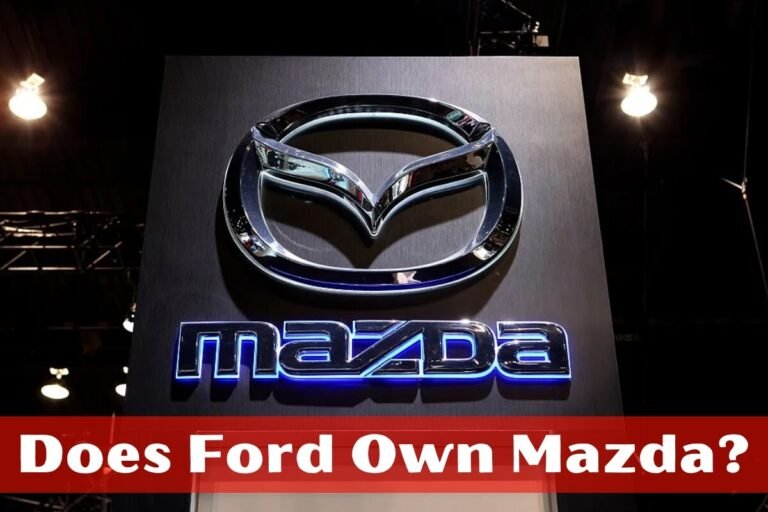Are Ford Fusions Good Cars? An In-Depth Look

For decades, the midsize sedan segment has been a battleground for automakers vying to offer the perfect blend of practicality, comfort, and value. Among the contenders, the Ford Fusion has carved out a notable presence, captivating drivers with its sleek styling, fuel-efficient powertrain options, and a host of tech features. However, as the automotive landscape evolves, the question remains: Are Ford Fusions good cars?
The short answer is yes, Ford Fusions are generally considered good and reliable cars, offering a well-rounded package for families, commuters, and eco-conscious drivers alike. However, their quality and reliability can vary depending on the specific model year.
Want to know if the Ford Fusion is the right car for you? We’ve got you covered! We’ll explore the Fusion’s performance, comfort, safety features, and ownership costs, as well as its strengths and weaknesses compared to other cars. We’ll also point out the best and worst years to buy, and common issues to look out for. By the end of this guide, you’ll have a clear picture of whether the Ford Fusion is your ideal ride.
Here’s what we’ll cover:
- Engine performance and fuel efficiency across various powertrain options
- Interior quality, cabin space, and technology features
- Safety and reliability ratings from authoritative sources
- Best and worst model years based on reliability and owner satisfaction
- Ownership costs, including maintenance, repairs, and fuel expenses
- Frequently asked questions and common concerns addressed
So, buckle up and join us as we navigate the world of the Ford Fusion, separating fact from fiction and empowering you to make an informed decision.
Engine Performance and Fuel Efficiency
One of the standout aspects of the Ford Fusion is its diverse range of powertrain options, catering to various driving preferences and budgets. From the base 2.5-liter four-cylinder engine to the more powerful turbocharged EcoBoost offerings and fuel-efficient hybrid variants, the Fusion offers something for everyone.
The base 2.5-liter four-cylinder engine produces 175 horsepower and 175 lb-ft of torque, providing adequate power for daily commuting and highway cruising. While not a powerhouse, this engine delivers a respectable balance of performance and fuel efficiency, with an EPA-estimated 21 mpg in the city and 31 mpg on the highway.
For those seeking a bit more excitement behind the wheel, the 1.5-liter EcoBoost turbocharged four-cylinder offers a compelling blend of power and efficiency. With 181 horsepower and 185 lb-ft of torque on tap, this engine provides a noticeable boost in acceleration and passing power while still achieving an impressive 23 mpg city and 34 mpg highway.
If you’re looking for even more punch, the 2.0-liter EcoBoost turbocharged four-cylinder in the range-topping Titanium trim might be the answer. Delivering 245 horsepower and 275 lb-ft of torque, this engine transforms the Fusion into a sprightly performer, capable of delivering an exhilarating driving experience without compromising too much on fuel economy (22 mpg city, 31 mpg highway).
For eco-conscious buyers, the Fusion Hybrid and Fusion Energi Plug-in Hybrid models offer remarkable fuel efficiency without sacrificing performance. The hybrid setup pairs a 2.0-liter four-cylinder engine with an electric motor, achieving an EPA-estimated 43 mpg city and 41 mpg highway. The Energi, with its larger battery pack, can travel up to 26 miles on electric power alone, making it an excellent choice for those with shorter commutes.
While the Ford Fusion may not be the most dynamic or exciting vehicle in its class, it delivers a well-rounded driving experience that should satisfy most buyers. The available all-wheel-drive system also enhances traction and confidence in inclement weather conditions.
Interior and Cabin Features
Stepping inside the Ford Fusion, you’ll find a cabin that prioritizes comfort, practicality, and user-friendly technology. While the interior materials and build quality may not be on par with premium luxury sedans, they are nonetheless decent for the segment, with a well-organized layout and a clean, uncluttered design.
The front seats offer ample support and comfort, even for longer journeys, while the rear seats provide sufficient legroom and headroom for adult passengers. The Fusion’s trunk space is also impressive, with 16 cubic feet of cargo capacity in non-hybrid models, making it a versatile choice for families or those with an active lifestyle.
One of the standout features of the Ford Fusion’s interior is the SYNC 3 infotainment system, which is standard on most trims. This user-friendly system features an 8-inch touchscreen display, intuitive menu navigation, and seamless integration with Apple CarPlay and Android Auto. Voice recognition capabilities further enhance the convenience, allowing you to control various functions without taking your hands off the wheel.
Higher trim levels of the Fusion offer additional luxury amenities, such as leather upholstery, dual-zone automatic climate control, and a premium audio system, elevating the cabin experience to a more upscale level.
Pros and Cons of the Ford Fusion’s Interior
While the Fusion’s interior is generally well-received, it’s essential to consider both its strengths and weaknesses:
Pros:
- Spacious cabin with ample room for passengers and cargo
- User-friendly SYNC 3 infotainment system with smartphone integration
- Comfortable front seats with good support
- Logical control layout and clean design
Cons:
- Rear headroom may be compromised for taller passengers due to the sloping roofline
- Some hard plastic surfaces, especially on lower trim levels
- Limited in-cabin storage spaces for smaller items
- Hybrid models have slightly reduced trunk space due to battery placement
Overall, the Ford Fusion’s interior strikes a balance between functionality, comfort, and technology, making it a practical and enjoyable space for daily commuting or long road trips.
Safety and Reliability Ratings
When it comes to evaluating a vehicle’s overall quality, safety and reliability ratings from reputable organizations play a crucial role. In this regard, the Ford Fusion has garnered respectable scores, though its performance varies across different model years.
The National Highway Traffic Safety Administration (NHTSA) has awarded the Ford Fusion a five-star overall safety rating, the highest possible score. This rating is based on rigorous crash testing and an evaluation of the vehicle’s safety features, such as airbags, electronic stability control, and anti-lock brakes.
Similarly, the Insurance Institute for Highway Safety (IIHS) has recognized the Fusion with its highest rating of “Good” in several crash test categories, including moderate overlap front, side, roof strength, and head restraint tests.
In terms of reliability, the Fusion has received average to above-average ratings from organizations like J.D. Power and Consumer Reports. However, it’s important to note that reliability can vary significantly depending on the specific model year.
Common Issues and Problems Reported by Owners
While the Ford Fusion is generally considered a reliable vehicle, it’s not immune to potential issues and problems. Some of the most commonly reported concerns include:
- Transmission Problems: Numerous owners have reported issues with the Fusion’s transmission, including harsh shifting, slipping gears, and delayed engagement. These problems can arise as early as 15,000 miles and may require software updates, valve body replacements, or complete transmission overhauls, depending on the severity.
- Power Steering Failure: Several Fusion models, particularly those from 2010 to 2014, have experienced power steering failures, resulting in a sudden loss of power assistance and difficulty maneuvering the vehicle. This issue has been the subject of multiple recalls and can be costly to repair.
- Swollen Lug Nuts: Some Fusion owners have encountered swollen or distorted lug nuts, which can make tire changes and wheel removal challenging. This problem is often attributed to the two-piece design of the lug nuts and their exposure to moisture and temperature fluctuations over time.
- Electrical Issues: Various electrical gremlins, such as faulty sensors, wiring problems, and control module failures, have been reported in certain Fusion models, leading to issues with the infotainment system, climate control, and other electronic components.
While these issues can be frustrating and costly to resolve, it’s important to note that not all Fusion models are affected, and many owners have enjoyed trouble-free ownership experiences. Regular maintenance and addressing problems promptly can help mitigate potential issues and extend the vehicle’s lifespan.
Best and Worst Model Years
Given the Ford Fusion’s production span from 2006 to 2020, potential buyers have a wide range of model years to choose from. However, not all model years are created equal when it comes to reliability and owner satisfaction. However, not all model years are created equal when it comes to reliability and owner satisfaction. Here’s a breakdown of the best and worst Ford Fusion model years to consider:
Most Reliable Ford Fusion Years
- 2015 Ford Fusion: The 2015 model year stands out as one of the most reliable and well-regarded Fusion iterations. With fewer reported issues and a solid overall build quality, the 2015 Fusion offers a dependable driving experience.
- 2018 Ford Fusion: The 2018 model year saw improvements in various areas, including refinement, technology, and overall reliability. Owners have praised the 2018 Fusion for its smooth ride, responsive powertrain, and user-friendly infotainment system.
- 2019 Ford Fusion: Building upon the success of the previous year, the 2019 Fusion continues to deliver impressive reliability and owner satisfaction. With fewer reported problems and a well-sorted driving experience, this model year is a safe bet for those seeking a dependable used Fusion.
- 2020 Ford Fusion: As the final year of production, the 2020 Fusion benefited from Ford’s accumulated knowledge and refinements. Many experts and owners consider this model year to be one of the most well-rounded and reliable iterations of the Fusion.
Ford Fusion Years to Avoid
While the Fusion has had its share of reliable model years, there are a few that potential buyers should approach with caution:
- 2010-2012 Ford Fusion: These early years of the second generation Fusion were plagued by a variety of issues, including widespread transmission problems, power steering failures, and electrical gremlins. Many owners reported frustrating and costly repairs during this period.
- 2013-2014 Ford Fusion: Although Ford addressed some of the previous issues, the 2013 and 2014 model years still suffered from transmission woes, as well as problems with the fuel system and other components. These model years are generally considered less reliable than later iterations.
- 2011 Ford Fusion: The 2011 model year stands out as particularly problematic, with an unusually high number of complaints related to power steering failures, transmission slippage, and sudden power loss. Avoiding the 2011 Fusion might be the safest bet if you’re seeking a reliable used model.
It’s important to note that while these model years are generally considered less reliable, individual experiences may vary. Proper maintenance and addressing issues promptly can help mitigate potential problems, regardless of the model year.
Ownership Costs and Value
Beyond reliability and performance, another crucial factor to consider when evaluating the Ford Fusion is the overall ownership costs and value proposition. Here’s a breakdown of what you can expect:
Maintenance and Repair Costs
According to RepairPal, the average annual maintenance and repair costs for the Ford Fusion are around $581. While this figure is slightly higher than the average for midsize cars ($526), it’s still relatively reasonable for the segment.
It’s worth noting that these costs can vary depending on the specific model year, mileage, and the severity of any repairs needed. For example, addressing transmission issues or replacing major components can significantly increase the overall repair costs.
Fuel Costs
The Ford Fusion’s fuel costs will largely depend on the powertrain option you choose. The base 2.5-liter four-cylinder engine offers decent fuel efficiency, with an EPA-estimated 21 mpg city and 31 mpg highway. However, opting for the more powerful EcoBoost engines or the hybrid variants can significantly improve your fuel economy and lower your overall fuel costs.
For instance, the Fusion Hybrid achieves an impressive 43 mpg city and 41 mpg highway, while the Fusion Energi Plug-in Hybrid can travel up to 26 miles on electric power alone, potentially reducing your fuel expenses even further.
Resale Value and Depreciation
Like most non-luxury vehicles, the Ford Fusion tends to experience moderate to average depreciation rates. According to industry experts, the Fusion can be expected to retain around 40-45% of its original value after five years of ownership.
While not exceptional, the Fusion’s resale value is on par with many of its competitors in the midsize sedan segment. Factors such as mileage, condition, and overall maintenance history can also impact the vehicle’s resale value.
Is the Ford Fusion Expensive to Maintain?
Based on the average annual maintenance and repair costs, the Ford Fusion is not considered an excessively expensive vehicle to maintain. However, it’s essential to factor in potential repair costs, especially for model years with known issues or higher mileage.
Regular maintenance, such as oil changes, brake pad replacements, and scheduled service, can help keep ownership costs in check and prevent more expensive repairs down the line.
Overall, the Ford Fusion offers a decent value proposition, balancing reasonable ownership costs with a well-rounded package of features, performance, and practicality.
Frequently Asked Questions
As a popular midsize sedan, the Ford Fusion has garnered its fair share of questions and concerns from potential buyers. Here are some frequently asked questions and their answers:
Does the Ford Fusion Last Long?
With proper maintenance and care, the Ford Fusion can be a relatively long-lasting vehicle. Many owners have reported their Fusions lasting well over 150,000 miles without major issues. However, as with any vehicle, the longevity of a Fusion will depend on factors such as driving habits, regular maintenance, and addressing any potential problems promptly.
What is the Mileage of the Ford Fusion per Liter?
The fuel efficiency of the Ford Fusion varies depending on the specific powertrain option:
- 2.5L Four-Cylinder: 13.6 km/l (manual transmission), 15.8 km/l (automatic transmission)
- 1.5L EcoBoost Turbocharged Four-Cylinder: 15.2 km/l
- 2.0L EcoBoost Turbocharged Four-Cylinder: 13.6 km/l
- Fusion Hybrid: 25.6 km/l (combined)
- Fusion Energi Plug-in Hybrid: 23.8 km/l (combined)
It’s important to note that these figures are based on EPA estimates and may vary depending on driving conditions, driving style, and other factors.
Does Ford Have Any Reliable Cars?
While the Ford Fusion has had its share of reliability ups and downs, Ford as a brand has produced several reliable models over the years. In fact, J.D. Power granted four Ford models awards in 2022 for their quality and dependability, including the Ford Ranger (midsize pickup), Mustang (midsize sporty car), and Bronco Sport (small performance SUV).
Why Are Ford Fusions So Popular?
The Ford Fusion’s popularity can be attributed to several factors, including its sleek and stylish design, fuel-efficient powertrain options, spacious and well-appointed interior, and a wide range of available features and technology. Additionally, the Fusion’s reputation for reliability (especially in its later model years) and competitive pricing have made it an attractive choice for families, commuters, and eco-conscious buyers alike.
The Bottom Lines
In the ever-evolving landscape of midsize sedans, the Ford Fusion stands out as a well-rounded and practical choice for those seeking a balance of style, performance, and value. While it may not be the most exhilarating or cutting-edge option in its class, the Fusion delivers a comfortable and refined driving experience, paired with a user-friendly interior and decent fuel efficiency.
When it comes to reliability and overall quality, the Fusion has had its fair share of ups and downs throughout its production run. While certain model years, such as the 2015, 2018, 2019, and 2020 iterations, are considered among the most reliable and well-regarded, others, like the 2010-2012 and 2013-2014 models, have been plagued by issues and should be approached with caution.
So, whether the Ford Fusion is a good car for you depends on your specific needs, priorities, and budget. If you value a spacious cabin, user-friendly technology, and a reputation for quality (in certain model years), the Fusion could be an excellent choice. However, if you prioritize driving excitement, cutting-edge features, or best-in-class reliability, you may want to explore alternatives from Honda, Toyota, or Mazda.






